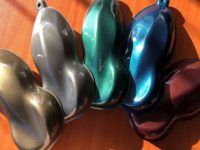
I'm sure that I don't need to tell you that respiratory protection is critical for anyone working in an industrial powder coating environment. According to the Occupational Safety & Health Administration (OSHA), Washington, powder coating workers must wear no less than what is called an "N95," NIOSH-approved respirator (otherwise known as a dust mask). These N95-type respirators are 95 percent efficient in protecting against hazardous particulate matter (in this case, powder coating dust) within their immediate breathing environment. These are commonly referred to as "dust masks" and feature a paper-like mask attached by head straps and a nose clip. Because the worker is not properly protected unless the mask is precisely worn, an annual fit test is required by OSHA. This can be a time-consuming and expensive process for employers.
Dust masks really are the bare minimum of "acceptable" protection. When it comes to respiratory protection, powered air purifying respirators (PAPR) represent the next level in protection. This system typically features a helmet/face shield, with a breathing hose attached to a belt-mounted motor and battery pack. While providing superior protection, many workers do indeed find these systems to be uncomfortable, cumbersome, loud and restrictive as they perform their tasks. This is even more of a problem for workers with glasses or facial hair.
One solution that recently was introduced to the powder coating market provides the best of both worlds. MaxAir is a powered air purifying respirator that works without hoses and is designed to be lightweight and comfortable to wear. The system eliminates the need for bulky blower motors and hoses by integrating a whisper-quiet motor inside the helmet, which circulates cool, fresh air continuously over the worker's face. Because it is a hose-free system, mobility is enhanced, thereby improving productivity. Most importantly, this increased function and comfort is achieved while also ensuring a superior level of protection - N100 vs. the N95 protection that comes with face masks.
Disposable dust masks quickly can become dirty and ineffective, causing workers to constantly switch them out throughout the workday - at a rate of four to eight in a single day. This unit will run continuously for 8 to 10 hr, and the filter media will last on average 100 to 140 hr. This translates into two to four weeks of filter use without needing a change. Its minimal decontamination process translates into more online time and less non-spraying time.
You asked if portable units are expensive. When weighing in all the costs and benefits of a respiratory protection line, you will want to look past the price sticker on the box. Think of the long term. A system that you may have thought was too expensive might be the most cost-effective solution for you, and may help increase your shop's productivity while keeping your employees safe and comfortable.



